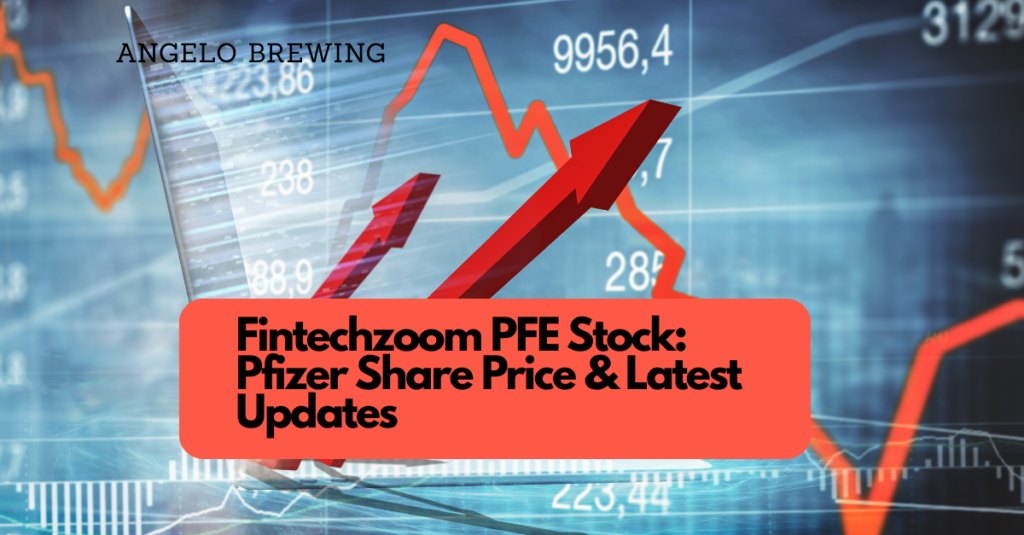The pharmaceutical sector, critical to global health and economic stability, continues to attract strong investor interest. Among these opportunities, Pfizer Inc. (PFE) stands out as a leader in healthcare innovation and a frequent topic in stock analysis. This article focuses on FintechZoom PFE stock, highlighting insights from FintechZoom, a well-known financial news platform that provides comprehensive market analysis, real-time updates, and investment guidance.
- Understanding the Collaboration Between FintechZoom and Pfizer
- Overview of Pfizer Inc.
- Current Stock Performance
- Current Profit and Sales Figures
- Pfizer’s Profit Forecast and 2026 Guidance
- COVID-19 Vaccine Updates
- Pipeline Highlights
- Strategic Moves: Obesity Drug and Haleon Sale
- Competitive Landscape: Pfizer Compared to Competitors
- When Will Pfizer Release Its Next Quarterly Results?
- Dividend Yield and Analyst Recommendations
- Stock Trends and Valuation
- Step-by-Step Guide to Investing in PFE Shares via Fintechzoom
- Pfizer's Outlook and Fintechzoom Forecasts
- Conclusion
- Call to Action
- Frequently Asked Questions: Fintechzoom PFE Share
Pfizer has maintained its position at the forefront of pharmaceutical innovation for decades, influencing both medical advancements and stock market dynamics. The company’s efforts to develop vaccines and treatments for global health challenges regularly draw investor attention, thereby impacting market sentiment. FintechZoom offers detailed analyses, key data, and forecasts to help investors optimize their strategies when considering Pfizer shares.
This article examines Pfizer’s performance, strategic moves, and FintechZoom’s insights, providing investors — both experienced and new — with critical information to make informed decisions about one of the most closely watched pharmaceutical stocks.
Understanding the Collaboration Between FintechZoom and Pfizer
FintechZoom: A Platform for Financial Insights
FintechZoom is recognized for its thorough stock market coverage, providing investors with actionable insights. Its offerings include real-time share price updates, detailed forecasts, and in-depth market analyses. The platform excels at translating complex market developments into clear, practical information, making it a trusted resource for investors navigating the unpredictable stock trading environment.
Pfizer: A Giant in the Pharmaceutical Industry
Pfizer Inc., with a history spanning over 170 years, has played a pivotal role in developing groundbreaking therapies and vaccines, particularly during global health crises. The company’s extensive research and development capabilities, along with its broad product portfolio, position Pfizer as a worldwide leader in pharmaceuticals, directly influencing investor confidence and share price trends.
The Synergy Between FintechZoom and Pfizer
While there is no formal partnership, FintechZoom’s coverage of Pfizer provides investors with valuable insight into business strategies, market trends, and product developments. Timely analyses, including forecasts of the impact of significant product launches or regulatory approvals, offer a comprehensive view of Pfizer’s stock potential and market positioning.
Overview of Pfizer Inc.
Founded in 1849, Pfizer has significantly shaped modern medicine through innovations in antibiotics, vaccines, oncology, cardiovascular treatments, and COVID-19 therapies. With a global footprint, a strong pipeline, and a history of stable dividends, Pfizer (NYSE: PFE) is closely followed by both institutional and retail investors.
For those investing in healthcare stocks, FintechZoom’s Pfizer analysis provides essential insights. Pfizer is not only a leading healthcare company but also a benchmark for how large pharmaceutical companies navigate evolving healthcare landscapes, including shifting vaccine demand, changing regulations, and rising competition in obesity and oncology markets. Investors consider both valuation and dividend strength when assessing whether Pfizer belongs on FintechZoom’s list of top buy recommendations.
Current Stock Performance
Share Price Overview
As of early January 2026, Pfizer shares traded around $25.18 per share, moving within a range of $24.40–$26.00 as investors digested the company’s 2026 outlook and strategic developments. Recent volatility reflects revised revenue guidance, declining COVID-19 product demand, and broader pharmaceutical sector dynamics.
The stock’s fluctuations have been modest; projections for 2026 revenue of $59.5–$62.5 billion and adjusted EPS of $2.80–$3.00 indicate continued headwinds from fading COVID-19 vaccine sales and patent expirations on key products. Investors tracking FintechZoom PFE daily view these fluctuations as reflections of broader sentiment in healthcare stocks, while income-focused investors value Pfizer’s consistent dividend across multiple market cycles.
Current Profit and Sales Figures
Pfizer’s latest quarterly results demonstrate resilience despite industry-wide challenges. Heading into 2026, the company reported sales of approximately $16.65 billion and EPS of about $0.87, both broadly in line with analyst expectations. While year-over-year revenue declined due to reduced COVID-19 product demand, growth in oncology treatments and non-COVID vaccines supported overall performance.
Cost control and strong product sales in oncology, cardiometabolic therapies, and other non-COVID treatments contributed to the results. Products like Eliquis and Vyndaqel continued to generate substantial revenue. Pfizer’s diversified portfolio provides earnings stability, making it more attractive to long-term investors than smaller biotech firms, whose revenue streams are often less predictable.
Pfizer’s Profit Forecast and 2026 Guidance
Pfizer updated its full-year 2026 guidance in December 2025, projecting adjusted diluted EPS of $2.80–$3.00 and revenue of $59.5–$62.5 billion. These projections reflect continued challenges from declining COVID-19 product sales and the expiration of exclusivity on certain drugs.
Management highlighted ongoing cost-cutting programs, operational efficiency initiatives, and strategic prioritization of key therapeutic areas, including oncology and newly acquired programs. Restructuring and productivity enhancements are expected to bolster margins and support profitability through 2026 and beyond. Analysts on FintechZoom view these updated expectations as evidence of Pfizer’s continued focus on sustainable growth despite broader market headwinds.
COVID-19 Vaccine Updates
Pfizer’s collaboration with BioNTech remains a cornerstone of its vaccine strategy. In late 2025, the LP.8.1-adapted COVID-19 vaccine for the 2025–2026 season produced a strong immune response, showing at least a four-fold increase in neutralizing antibodies in older adults and at-risk populations.
While total sales may not reach pandemic-era levels, continued seasonal booster demand is expected, similar to annual influenza vaccines, providing Pfizer with a recurring revenue stream.
Pipeline Highlights
Pfizer’s R&D pipeline continues to drive investor interest:
- Oncology: Expanding treatments for breast and prostate cancer
- Vaccinations: COVID-19 booster and influenza programs
- Rare Diseases: Clinical-phase gene therapy programs
- Immunology: Biological drugs for autoimmune conditions
Even amid lower COVID-19 demand, vaccine success ensures Pfizer has sufficient cash flow to reinvest in innovative therapies, strengthening its position in long-term investment portfolios.
Strategic Moves: Obesity Drug and Haleon Sale
Discontinuation of Danuglipron
In 2025, Pfizer halted development of its oral obesity drug Danuglipron due to safety concerns, reducing near-term potential in the obesity treatment market, projected to exceed $100 billion annually. Pfizer’s strategic pivot includes acquiring Metsera to re-enter this market through clinical-stage programs rather than its own discontinued candidate.
Sale of Haleon Shares
Pfizer completed the sale of its consumer healthcare business, Haleon, divesting its entire stake for $3.24 billion, entirely exiting the consumer health segment. This move strengthened the balance sheet and enabled management to focus solely on pharmaceuticals and vaccines, reinforcing Pfizer’s long-term goal of becoming a pure pharmaceutical company.
Reflecting this focus, in Q3 2025, Pfizer reported $16.65 billion in sales and EPS of $0.87, in line with expectations despite revenue pressure from declining COVID-19 products. Heading into 2026, Pfizer continues to prioritize core segments to sustain growth and profitability, reinforcing its position as a focused, leading pharmaceutical company.
Competitive Landscape: Pfizer Compared to Competitors
Pfizer operates in a highly competitive environment. Moderna continues to drive innovation in mRNA, Johnson & Johnson has a strong position in the diversified healthcare sector, and Novo Nordisk dominates the obesity treatment market.
Pfizer’s unique selling point lies in the size and diversity of its product portfolio. Its oncology portfolio is growing, its rare disease drugs are becoming increasingly important, and its vaccine platform remains world-class. Unlike smaller biotech companies, Pfizer has the financial resources to absorb product setbacks and reinvest heavily.
Competitive Comparison
| Company | Strengthen | Weaken |
| Pfizer (PFE) | Diversified portfolio, high dividend yield, global reach | Relapse in use of anti-obesity medication, slower growth |
| Moderna (mRNA) | Innovative mRNA platform, rapid research and development | Heavy dependence on COVID-19 products |
| Johnson & Johnson (JNJ) | Diversified supply model, solid balance sheet | Legal risks in consumer healthcare |
| Novo Nordisk (NVO) | Market leader in obesity and diabetes medicines | Limited diversification beyond metabolic diseases |
When Will Pfizer Release Its Next Quarterly Results?
Pfizer’s following quarterly report is expected on February 3, 2026, when the company will release its Q4 2025 results before the market opens.
Investors are particularly interested in:
- Sales trends in the oncology sector
- COVID‑19 vaccination rates over the winter
- Progress in development programs outside of obesity
For short‑term investors, earnings numbers often lead to price fluctuations in Fintechzoom (PFE) shares. For long‑term investors, each quarter provides clarity on whether Pfizer is generating stable revenue and achieving its cost‑cutting goals.
Dividend Yield and Analyst Recommendations
Pfizer maintains an above-average dividend, making it attractive for income-oriented portfolios. Analysts are divided:
- Buy: Based on valuation, strong dividend, and product portfolio potential
- Hold: Reflecting slower obesity drug growth and moderate vaccine demand.
Currently, a consensus leans toward hold, with some recommending buy for conservative investors seeking steady income.
Stock Trends and Valuation
As of December 2025, Pfizer shares traded near $25.8, with a market capitalization of $142.3 billion, a P/E ratio of 33.15, and EPS of $0.75. The expected dividend of $1.68 yields ~6.77%, supporting investor interest.
Factors influencing PFE performance include:
- Market Demand and Healthcare Trends: The global aging population and the rise in chronic diseases are driving demand for Pfizer’s products.
- Regulations: FDA approvals, health policies, and drug prices directly impact profitability.
- Financial Performance: Earnings per share (EPS), revenue growth, and profit margins determine investor confidence.
- Technological Innovation and Competitiveness: Successful drug development strengthens market position.
- Global Economic Conditions: Exchange rates, economic growth, and recessions affect stock valuations.
Step-by-Step Guide to Investing in PFE Shares via Fintechzoom
- Create Your Fintechzoom Account: Create a profile to receive personalized updates on health topics and Pfizer stocks.
- Use Tools to Track Stock Performance: Interactive charts, historical data, and expert commentary allow you to identify trends.
- Stock Analysis Insights: Get detailed analysis of financial results, product launches, and global developments.
- Make Investment Decisions: Use insights to assess risks and potential returns and make investments through your brokerage platform.
Pfizer’s Outlook and Fintechzoom Forecasts
Pfizer’s strong research base and promising product portfolio in oncology, rare diseases, and immunology point to significant growth. Fintechzoom provides forecasts by analyzing upcoming drug trials, regulatory outcomes, and market scenarios.
External factors such as global economic trends, demographic changes, and healthcare policies are also taken into account.
Pfizer’s long-term growth potential is strengthened by its sustainability initiatives, its global program to improve healthcare access, and its alignment with investor interests.
Conclusion
Pfizer remains one of the world’s most closely watched pharmaceutical stocks. Its earnings, dividends, product portfolio, and strategic direction make the company attractive to both conservative and value-oriented investors.
Fintechzoom’s analyses help investors understand current trends, predict price movements, and make informed investment decisions.
Call to Action
For detailed insights and up-to-date information on Pfizer and other stocks, visit Fintechzoom regularly.
- Read the articles
- Participate in discussions
- Subscribe to the newsletter to get the latest financial news straight to your inbox.
Frequently Asked Questions: Fintechzoom PFE Share
Q: What is Fintechzoom?
Answer: Fintechzoom is a financial news platform that provides real-time updates, analysis, and forecasts on stocks, including Pfizer.
Read: FintechZoom.com Cryptocurrency? A Beginner’s Guide to Digital Finance
Q: Why is Pfizer stock important to investors?
Answer: Pfizer’s product pipeline, particularly its vaccines and treatments, impacts portfolios and industry developments.
Q: How does Fintechzoom analyze PFE shares?
Answer: Using quantitative and qualitative analyses, technical indicators, market trends, and expert opinions.
Q: According to Fintechzoom, what factors affect PFE’s shares?
Answer: Product portfolio, regulations, financial results, innovations, and global economy.
Q: How can I invest in Pfizer via Fintechzoom?
Answer: Create an account, follow the results, read analyses, and invest via your brokerage platform.
Q: What are Pfizer’s prospects according to Fintechzoom?
Answer: Growth driven by new products in oncology, immunology, and rare diseases, as well as favorable regulatory conditions.
Q: What are the most important current trends for PFE stock?
Answer: Global developments in healthcare, new products, regulatory approvals, and profit figures.
Q: How do regulations affect Pfizer’s stock?
Answer: Changes in drug approvals, health policies, and prices directly impact sales and company valuation.
Q: What innovations could affect the share price?
Answer: Drug development, production efficiency, and treatment methods for chronic diseases are increasing investor confidence.
Q: How often does Fintechzoom update its PFE stock analysis?
Answer: Regular: Real-time updates, monthly forecasts, and detailed reports after essential announcements.




